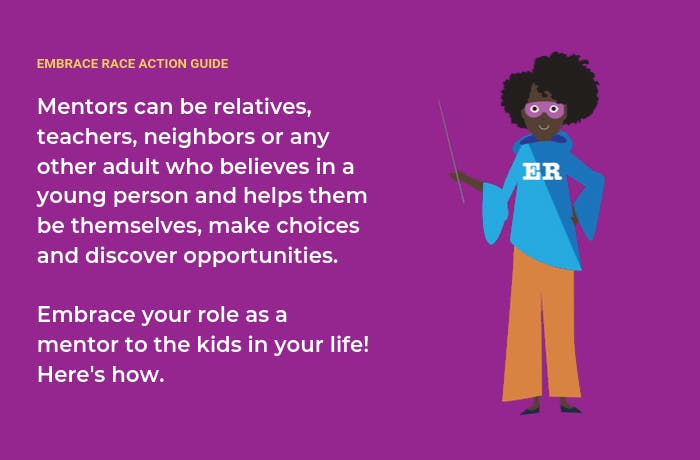Mentoring strategies to support every child
by Dudney Sylla of MENTOR, The National Mentoring Partnership &
Dr. Torie Weiston-Serdan, Youth Mentoring Action Network

We work in and with formal mentoring programs but mentoring can be informal, too. Mentors can be relatives, teachers, neighbors, coaches, the bus driver or any other adult who believes in a young person and helps them be themselves, make choices and discover opportunities. Quality mentoring relationships have powerful, positive effects on young people, making them much more likely to graduate, go to college, volunteer, and less likely to be depressed, to name a few. Unfortunately, one in three young people say they don’t have that one adult they feel they can turn to in moments big and small. That’s 9 million young people.
How to pay it forward and embrace your role as a mentor to the kids in your life? We recommend cultivating a Mentor Mindset and practicing Critical Mentoring. For more, check out our conversation with EmbraceRace.
Cultivate a Mentoring Mindset
1. Adopt the "I see you" approach
As an informal mentor you can be intentional in affirming the interests and goals of young people alongside supporting them toward family, community and institutional goals.
2. Share power.
Young people thrive when mentors support them to make their own choices, and develop the capacities they need to know themselves and figure out how they want to be and contribute to the world. (See the Search Institute’s Developmental Relationships Framework for more information.)
3. Connect young people to other caring adults who can support their needs and interests.
Young people don’t develop in a vacuum, they develop in relation to others. America’s Promise Alliance’s Center for Promise put out a great explainer on the importance of “webs of support” for young people.
Practice "Critical Mentoring"
1. Be authentic.
Young folks know when you are bluffing, so be natural and open. This helps to build a relationship from a positive starting point.
2. Be reflective.
Understand that your experiences and identities may not align with those of your protege. That's ok, but being reflective, thoughtful and critical helps us to navigate various issues and remain open to feedback and learning.
3. Be willing to do self-work.
Before we get in front of young people we should be willing to explore ourselves, our relationships with other folks and various happenings in our world. We can't help youth work on themselves if we don't work on us first.
Dudney Sylla

Torie Weiston-Serdan



